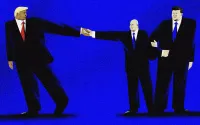19 January 2006Gary Olson
The other day I was involved in an animated conversation with half a dozen people and the subject briefly turned to the film, Brokeback Mountain. Someone at the group's fringe, a person who had not seen the film, smirked and and uttered words to the effect that given their sexual orientation, the two gay male sheep herders in the film were undoubtedly comfortable around sheep.
Not quite believing I'd heard correctly -- but knowing I had -- I was discombobulated. I remained silent. After an awkward moment the conversation took a different turn and his homophobic slur passed into the ether of ordinary, everyday bigoty.
For the remainder of the day I was haunted by my failure to verbally engage that individual, plagued by the knowledge that I hadn't measured up to my own minimum expectations of being a decent person. Had I been complicit in some perverse heterosexual bonding?
For multiple reasons, I should be extra sensitive and assertive in these circumstances. I have a daughter who's a GLBT activist; I teach courses in this subject matter on a regular basis; and I like to think of myself as being fearless in expressing unpopular positions. But in that moment of truth, I let myself down. I remained silent. Why?
Was I terrified about a moment of tension with a stranger? Afraid of alienating others in the room or making them uncomfortable? Worried about being accused of hyper political correctness? Turning something light-hearted into something serious and "political?" Or did I worry that in the future, some people might think, "Oh, oh. Here's comes Gary. We'd mind our p's and q's."
Given the benefit of hindsight, I might have initiated a conversation. Perhaps, "I'm sorry, but I heard what you said and I'm gay. Did you mean to imply that I like to sleep with sheep?" Of course, I don't know how he would have responded but let's assume he apologized. Then I might have followed up with, "Actually, I'm not gay. But it's instructive that when you thought I was gay you felt an apology was appropriate. Do you only say things like that when you think everyone is straight? You must think all heterosexuals are homophobic because you obviously felt we'd all agree with your homophobic slur. Otherwise why would you take the risk of saying it?" (This approach is gratefully adapted from Tim Wise's invaluable new book on white privilege, White Like Me, 2005, paper).
What positive outcomes might have occurred? First, had I engaged this person in conversation, it might have given others courage to speak up in future settings. Second, having spoken up, it might be slightly easier for me to do so again. Finally, this individual might have done some critical reflection about his underlying prejudice. But I remained silent.
Yes, it was a minor incident in the larger scheme of structual injustices but my sin of omission was an act of collaboration with ugly bigotry. And it wasn't the first time I've let homophobic, racist and sexist comments, gestures, and jokes slide by without challenge.
The aggregate total of these small failures of nerve is the construction of a wall of social bigotry. As journalist Doug Ireland recently reported in Znet, in settings like Iran it's now a literal killing wall where a dozen gay men were recently executed.
At a minimum each unchallenged homophobic slur contributes to a climate of anti-gay harrassment, bias, and abuse. This further marginalizes lesbians and gay people, leaving them invisible and more subject to discrimination and subtle coercive pressure to conform.
What to do? There are many anti-discrimination laws on the books. Some are even enforced. Beyond that, I strongly oppose speech codes as patronizing and > probably unconstitutional. They also tend to drive heterosexism underground rather than confronting it.
As Yale law professor Kenji Yoshino urges, lasting solutions reside beyond courtrooms and laws. They germinate in conversations that happen "...in public squares and prayer circles, in workplaces and on playgrounds. They should occur informally and intimately, in the everyday places where tolerance is made and unmade."
I hope I find the courage to speak up next time. I need to do it for myself. Sadly, I know I'll have many more opportunities.
Gary Olson is chair of the Political Science Department at Moravian College in Bethlehem,PA. Contact: [email protected]
http://www.zmag.org/content/showarticle.cfm?SectionID=91&ItemID=9552






